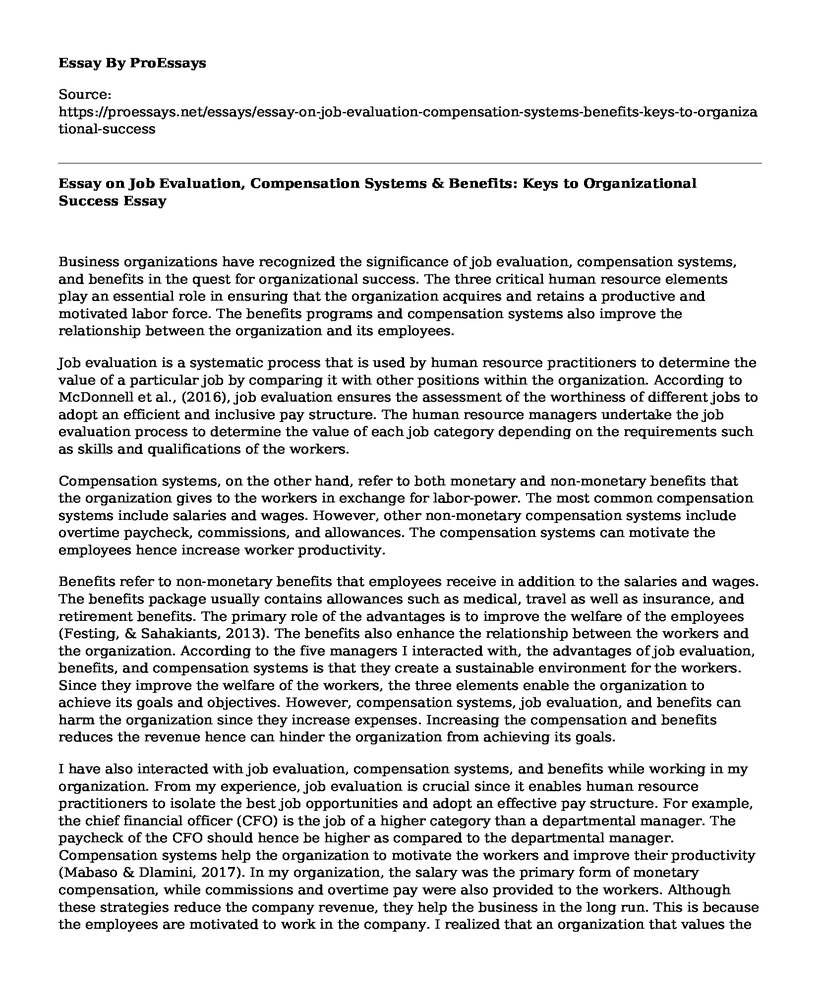Business organizations have recognized the significance of job evaluation, compensation systems, and benefits in the quest for organizational success. The three critical human resource elements play an essential role in ensuring that the organization acquires and retains a productive and motivated labor force. The benefits programs and compensation systems also improve the relationship between the organization and its employees.
Job evaluation is a systematic process that is used by human resource practitioners to determine the value of a particular job by comparing it with other positions within the organization. According to McDonnell et al., (2016), job evaluation ensures the assessment of the worthiness of different jobs to adopt an efficient and inclusive pay structure. The human resource managers undertake the job evaluation process to determine the value of each job category depending on the requirements such as skills and qualifications of the workers.
Compensation systems, on the other hand, refer to both monetary and non-monetary benefits that the organization gives to the workers in exchange for labor-power. The most common compensation systems include salaries and wages. However, other non-monetary compensation systems include overtime paycheck, commissions, and allowances. The compensation systems can motivate the employees hence increase worker productivity.
Benefits refer to non-monetary benefits that employees receive in addition to the salaries and wages. The benefits package usually contains allowances such as medical, travel as well as insurance, and retirement benefits. The primary role of the advantages is to improve the welfare of the employees (Festing, & Sahakiants, 2013). The benefits also enhance the relationship between the workers and the organization. According to the five managers I interacted with, the advantages of job evaluation, benefits, and compensation systems is that they create a sustainable environment for the workers. Since they improve the welfare of the workers, the three elements enable the organization to achieve its goals and objectives. However, compensation systems, job evaluation, and benefits can harm the organization since they increase expenses. Increasing the compensation and benefits reduces the revenue hence can hinder the organization from achieving its goals.
I have also interacted with job evaluation, compensation systems, and benefits while working in my organization. From my experience, job evaluation is crucial since it enables human resource practitioners to isolate the best job opportunities and adopt an effective pay structure. For example, the chief financial officer (CFO) is the job of a higher category than a departmental manager. The paycheck of the CFO should hence be higher as compared to the departmental manager. Compensation systems help the organization to motivate the workers and improve their productivity (Mabaso & Dlamini, 2017). In my organization, the salary was the primary form of monetary compensation, while commissions and overtime pay were also provided to the workers. Although these strategies reduce the company revenue, they help the business in the long run. This is because the employees are motivated to work in the company. I realized that an organization that values the welfare of its workers stand a chance of achieving both its short- and long-term goals.
The three critical human resource elements, job evaluation, benefits, and compensation systems, all result in the success of the organization. After interacting with the three elements in my organization, I can categorically rate them as follows:
- Job Evaluation-6 (Averagely effective)
- Compensation systems-10 (Very Effective)
- Benefits Program-7 (Averagely effective)
The most effective strategy that can easily lead to success within the organization is the compensation strategy. This is because the adoption of a multi-dimensional compensation strategy provides both monetary and non-monetary benefits to the workers. The provision of salaries and wages alongside allowances and commissions motivates the employees hence making them develop a profound interest in working in the organization. Therefore, contemporary business organizations should adopt effective strategies aimed at improving job evaluation, compensation systems, and benefit programs.
References
Festing, M., & Sahakiants, I. (2013). Path-dependent evolution of compensation systems in Central and Eastern Europe: A case study of multinational corporation subsidiaries in the Czech Republic, Poland and Hungary. European management journal, 31(4), 373-389.
Mabaso, C. M., & Dlamini, B. I. (2017). Impact of compensation and benefits on job satisfaction. Research Journal of Business Management, 11(2), 80-90.
McDonnell, A., Gunnigle, P., Lavelle, J., & Lamare, R. (2016). Beyond managerial talent:' Key Group' identification and differential compensation practices in multinational companies. The International Journal of Human Resource Management, 27(12), 1299-1318.
Cite this page
Essay on Job Evaluation, Compensation Systems & Benefits: Keys to Organizational Success. (2023, Mar 28). Retrieved from https://proessays.net/essays/essay-on-job-evaluation-compensation-systems-benefits-keys-to-organizational-success
If you are the original author of this essay and no longer wish to have it published on the ProEssays website, please click below to request its removal:
- Essay Example on Performance Management
- Ambush Marketing Essay Example
- The Socio-Economic Trends in My Family Tree Essay Example
- Essay Sample on Recruitment Challenges for 21st-Century HR Managers
- Paper Example on RFID: Automating Industries for Cost-Saving & Efficiency
- Essay Example on Social Style Model: Enhancing Workplace Quality
- Quantity Surveyors: Profession for Construction Projects Cost Management - Research Paper Sample







